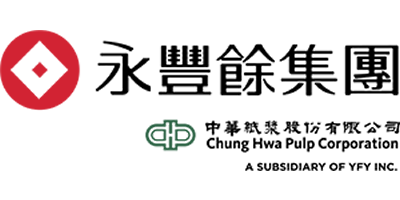
Every Byproduct has Its Value - Rediscovery of Hydrogen Energy
YFY Inc

YFY believes that everything has its values. It is people who produce waste, not the earth itself. In other words, there should be no wastes at all, as long as people find the right approach to utilize every single resource they obtain.
INTRODUCTION
Turning Waste into Valuables: CHP, one of YFY’s subsidiaries, recycles the byproduct from electrolysis of Sodium Chloride (salt), which is used in the process of pulp production. After collection, CHP purifies it into Hydrogen Energy with 99.99% of purity, a complete CO2-free energy.Enabling the Development of Hydrogen Energy Industry in Taiwan: In addition to using the hydrogen energy collected from the pulp production as its fuel source, CHP was entrusted by the Bureau of Energy, Ministry of Economic Affairs, with the cooperation of Asia Pacific Fuel Cell Technologies to establish a field demonstration site for hydrogen energy.
Actual Hydrogen Energy Applications with CHP:
- To fill hydrogen batteries which can be used for fuel cell electric vehicles (FCEV).
- To replace heavy oil as fuel to produce steam.
FRAMEWORK AND STRATEGY
YFY believes that everything has its values. It is people who produce waste, not the earth itself. In other words, there should be no wastes at all, as long as people find the right approach to utilize every single resource they obtain.There are always byproducts produced in every manufacturing process. In most cases, these byproducts are treated as mere wastes. But this is not the case in YFY. What YFY does is to find the value for each byproduct, and recycle as many byproducts as possible. In 2014, YFY recycled 76% of the so-called “wastes” generated during the manufacturing process. “Zero Waste” and “Zero Emission” are YFY’s ultimate goals.
In this project, CHP has demonstrated its advantage on generating hydrogen. Comparing with the hydrogen reformed from fossil fuels with only 75% of purity, the purity of the hydrogen CHP collected from the process of Sodium Chloride electrolysis is 95%. The high purity of hydrogen makes further purifying process to 99.99% of purity more efficient and more cost-effective.
ACHIEVEMENT AND IMPACT
Global warming and climate change are one of the biggest issues which people are facing nowadays. Hydrogen is a 100% carbon neutral clean energy with only water as its byproduct.CHP has built a recycling system for hydrogen collection and the system has started running from April, 2015. In 2015 alone, it reduced the heavy oil consumption by 436,300 liters, and dropped 1,287 tons of CO2 emission.
CHP is capable of producing 450 tons of hydrogen byproducts every year. If all hydrogen byproducts are used to fill batteries, nearly 1,000,000 cans of hydrogen batteries could be filled. And 1,000,000 cans of hydrogen batteries would enable 45,000 fuel cell electric motorcycles to run a total of 206,510 circuits of Taiwan. It can be expected that significant declines on CO2 emission will take place when the fuel cell electric motorcycles are on the road to replace some of the traditional motorcycles.
Also, a demo site of hydrogen energy in CHP serves to inform the people on the possibilities of hydrogen usage.
FUTURE DIRECTION
The application of hydrogen is actually broader than it seems. Hydrogen can power our everyday lives by heating our homes, powering our industries, charging our appliances and fueling our motorcycles, cars, buses and ships. The hydrogen industry encompasses a vast number of connected and interdependent fields that work together. YFY will continue to seek opportunities to cooperate with affiliates in order to develop more hydrogen energy applications in its mills.The core value of YFY is to minimize the environmental impact and to maximize the social impact, while providing fair returns to its stakeholders. Thus, YFY will continue to pursue its “Zero Waste” and “Zero Emission” goals. It will keep trying to discover the value of each byproduct and residue, and recycle all resources.

Since its establishment in 1924, YFY has stayed true to a set of core principles while maintaining flexibility in a changing environment. Paper production remains YFY’s core business, where it has invested in a highly diversified portfolio of companies. The products and positioning are adapted in response to the times, but it never wavers in its promises and responsibilities to its employees, society, and the environment.




